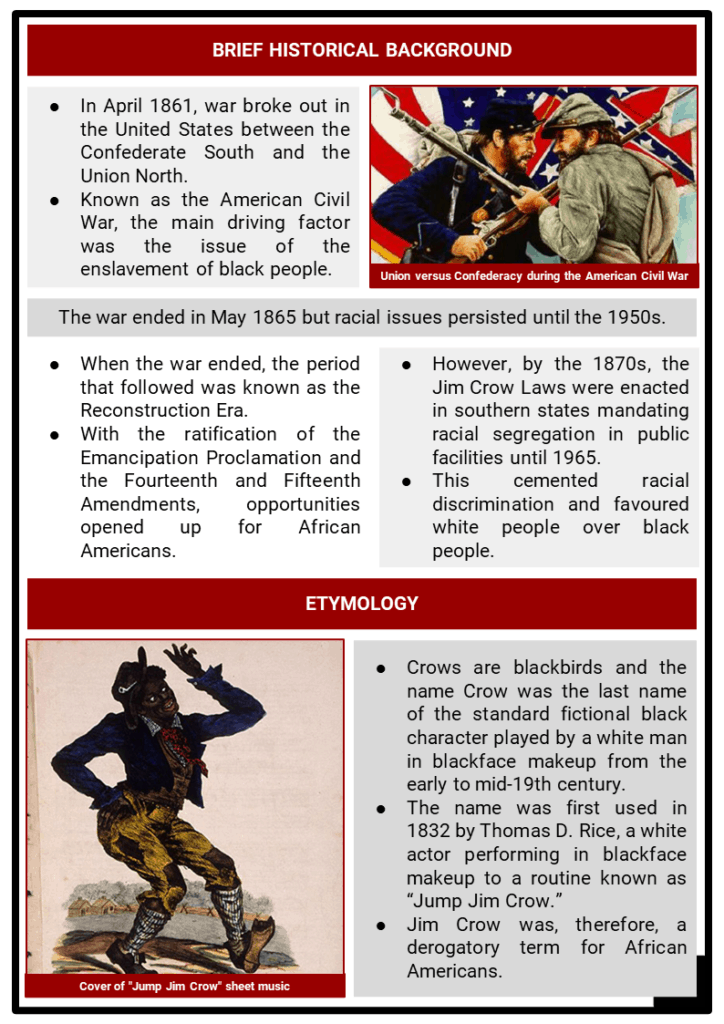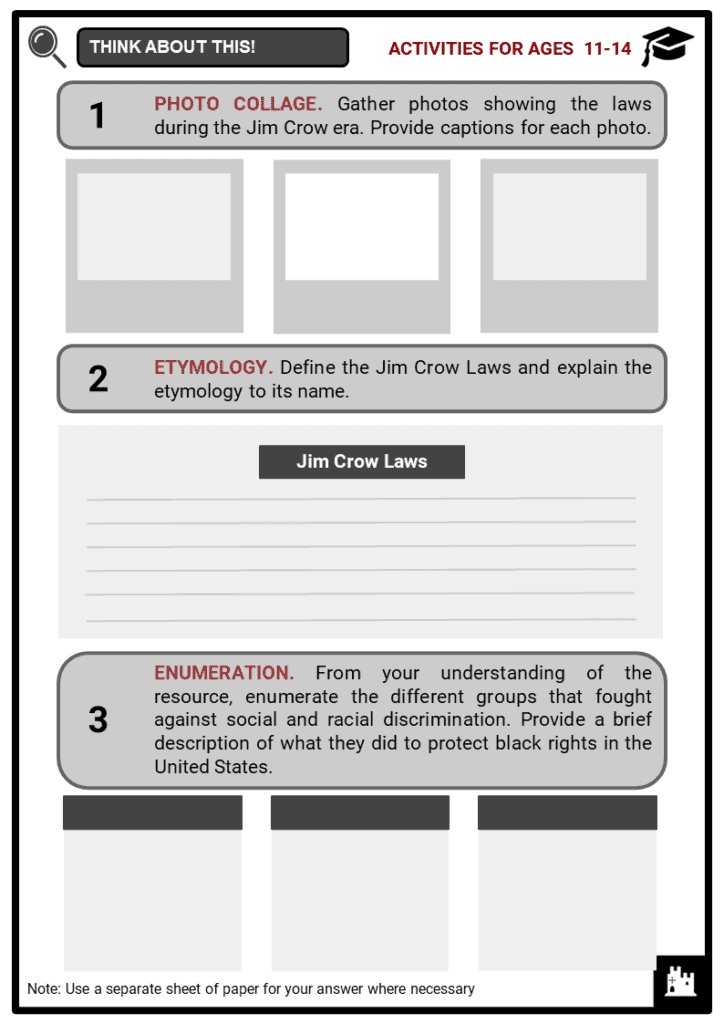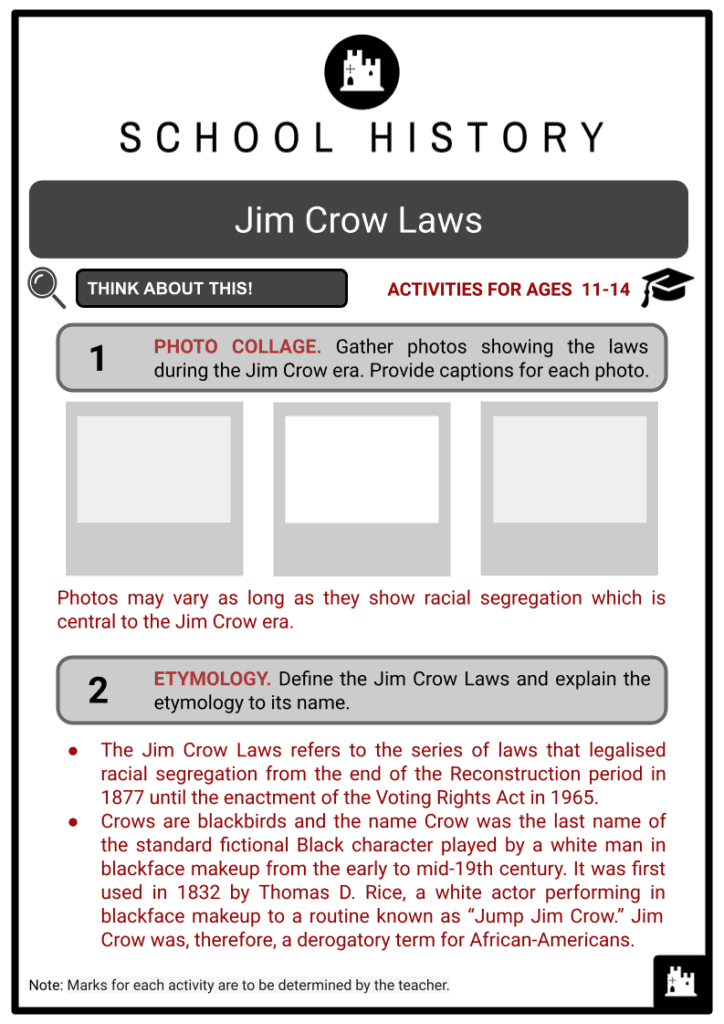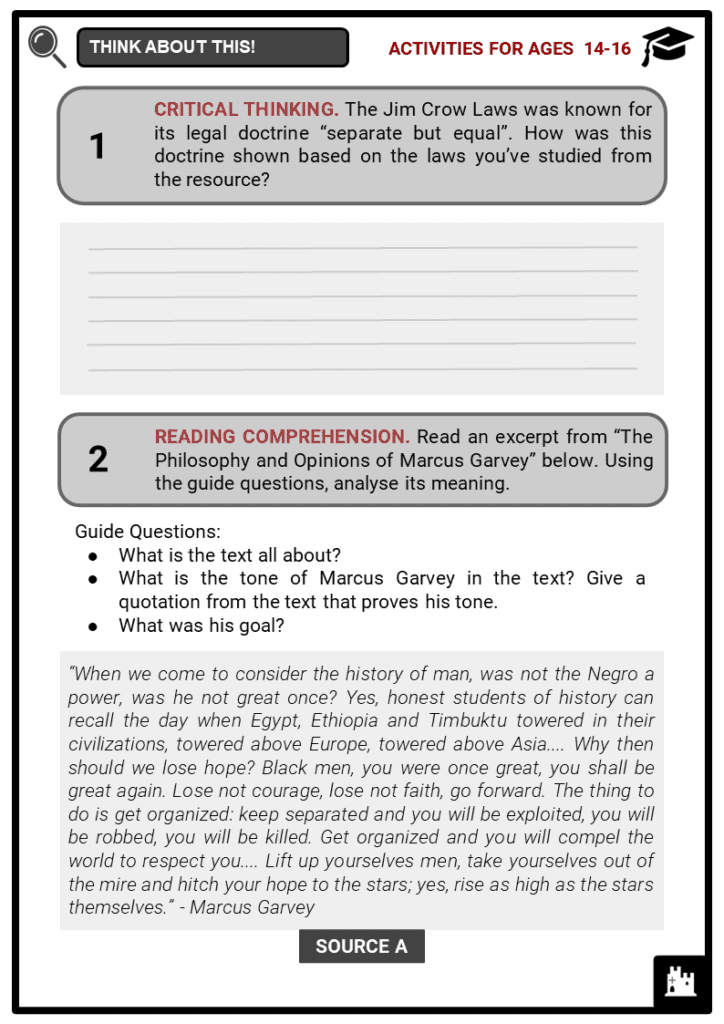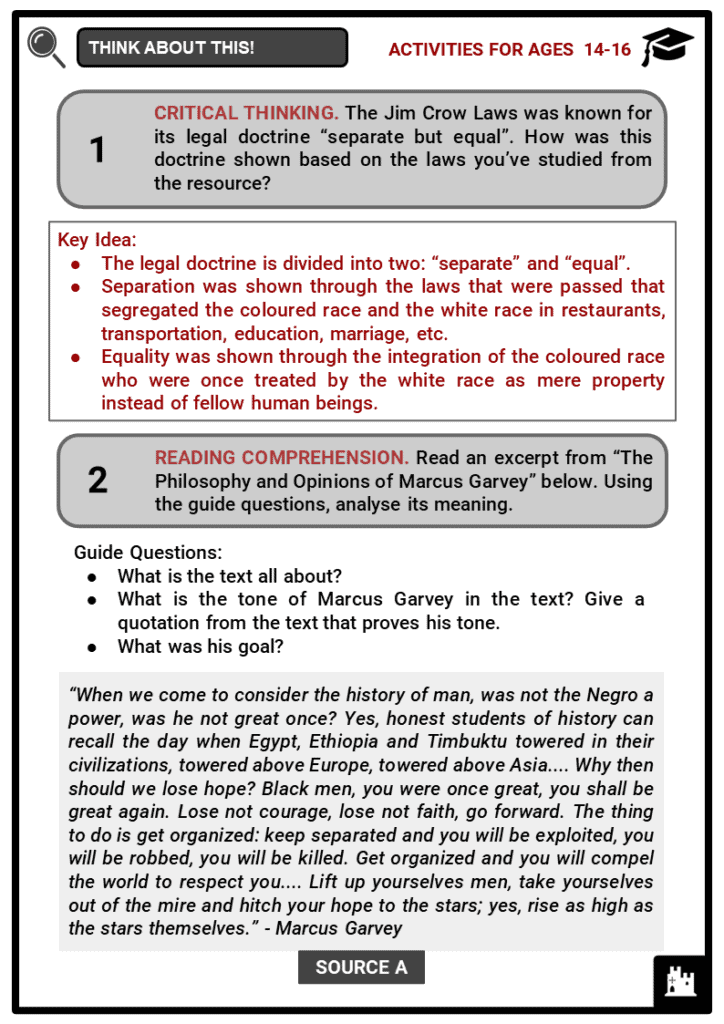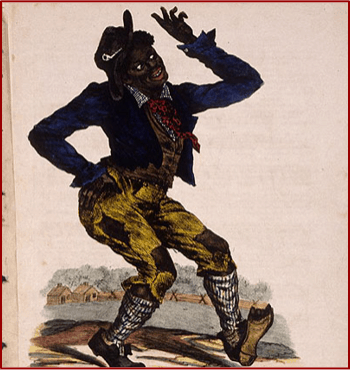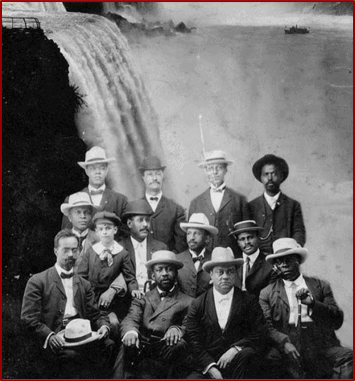Download Jim Crow Laws Worksheets
Do you want to save dozens of hours in time? Get your evenings and weekends back? Be able to teach Jim Crow Laws to your students?
Our worksheet bundle includes a fact file and printable worksheets and student activities. Perfect for both the classroom and homeschooling!
Table of Contents
Add a header to begin generating the table of contents
Summary
- Brief historical background prior to the Jim Crow Laws
- Etymology of Jim Crow
- Establishment of the Jim Crow system
- Notable Jim Crow Laws of the states
Key Facts And Information
Let’s know more about Jim Crow Laws!
- During the Reconstruction period which aimed to bring back the seceded states and integrate the Black population to the United States, white southern Democrat-dominated state legislatures were created to disenfranchise Black people. The Jim Crow Laws refers to the series of laws that legalised racial segregation from the end of the Reconstruction period in 1877 until the enactment of the Voting Rights Act in 1965. This series of laws was known for its legal doctrine “separate but equal” which was applied to the facilities made for Black people.
Brief Historical Background
- In April 1861, war broke out in the United States between the Confederate South and the Union North.
- Known as the American Civil War, the main driving factor was the issue of the enslavement of Black people.
- The war ended in May 1865 but racial issues persisted until the 1950s.
- When the war ended, the period that followed was known as the Reconstruction Era.
- With the ratification of the Emancipation Proclamation and the Fourteenth and Fifteenth Amendments, opportunities opened up for African-Americans.
- However, by the 1870s, the Jim Crow Laws were enacted in southern states mandating racial segregation in public facilities until 1965.
- This cemented racial discrimination and favoured white people over Black people.
Etymology
- Crows are blackbirds and the name Crow was the last name of the standard fictional black character played by a white man in blackface makeup from the early to mid-19th century.
- The name was first used in 1832 by Thomas D. Rice, a white actor performing in blackface makeup to a routine known as “Jump Jim Crow.”
- Jim Crow was, therefore, a derogatory term for African-Americans.
Establishment of the Jim Crow System
- Racism was extensive during the 1920s. Non-whites and people who did not have “American” religious beliefs were discriminated against.
- Whites experienced discrimination anxiety, which is anxiety caused by thinking that other races will take over and bring an end to the white race and culture.
- This discrimination anxiety of the whites made them create the Jim Crow Laws.
- The Jim Crow Laws refers to the collection of state and local statutes which made racial segregation legal.
- It started towards the end of the Reconstruction Period in 1877 until the enactment of the Voting Rights Act in 1965.
- It mandated the ‘separate but equal’ status of African-Americans.
- The Black Codes of 1865, created after the abolition of slavery by the Thirteenth Amendment and the actions of the Ku Klux Klan (KKK), are precursors to the Jim Crow Laws. The former laws ensured that the systematic oppression of Black people was legalised even with the constitutional amendment that the KKK was a terrorist group that was meant to suppress any form of black excellence.
- To escape the harsh segregation laws in the South, Black people continued to move to the northern and western parts of the U.S.
- However, they were faced with other laws and attitudes that barred Black people from forming and joining specific types of unions or finding employment in industries that were the preserve of white employees.
- Despite the discrimination, in 1896, African-American women established the National Association of Coloured Women which advocated for women's suffrage and the progression of other forms of civil rights.
- In 1905, W.E.B. Du Bois and William Monroe Trotter created the Niagara Movement that mobilised Black people all over the country to fight against racial inequality.
- The Niagara Movement went on to become the National Association for the Advancement of Coloured People (NAACP) which fought against social and racial bias through legislative advocacy, court cases and public protests.
- In 1960, the Congress for Racial Equality (CORE) and the Student Nonviolent Coordinating Committee (SNCC), focused on organising peaceful opposition to racial discrimination laws and attitudes throughout the U.S.
- In 1964, 1965 and 1968, the Civil Rights Act, the Voting Rights Act and the Fair Housing Act respectively were enacted, bringing an end to the Jim Crow system.
The Jim Crow Laws
- Racial segregation through the Jim Crow system was a way of life. After its establishment, numerous states enforced legal punishments when consorting with another race.
- Though there were a variety of laws imposed, the most common laws were issues on intermarriage and education.
- Some notable laws of the states under the Jim Crow system include:
Georgia
- Amateur Baseball
- It shall be unlawful for any amateur white baseball team to play baseball on any vacant lot or baseball diamond within two blocks of a playground devoted to the Negro race, and it shall be unlawful for any amateur colored baseball team to play baseball in any vacant lot or baseball diamond within two blocks of any playground devoted to the white race.
- Parks
- It shall be unlawful for colored people to frequent any park owned or maintained by the city for the benefit, use and enjoyment of white persons...and unlawful for any white person to frequent any park owned or maintained by the city for the use and benefit of colored persons.
- Mental Hospitals
- The Board of Control shall see that proper and distinct apartments are arranged for said patients, so that in no case shall Negroes and white persons be together.
- Wine and Beer
- All persons licensed to conduct the business of selling beer or wine ... shall serve either white people exclusively or colored people exclusively and shall not sell to the two races within the same room at any time.
- Barbers
- No colored barber shall serve as a barber [to] white girls or women.
- The officer in charge shall not bury, or allow to be buried, any colored persons upon ground set apart or used for the burial of white persons.
Louisiana
- The Blind
- The board of trustees shall...maintain a separate building...on separate ground for the admission, care, instruction, and support of all blind persons of the colored or black race.
- Circus Tickets
- All circuses, shows, and tent exhibitions, to which the attendance of...more than one race is invited or expected to attend shall provide for the convenience of its patrons not less than two ticket offices with individual ticket sellers, and not less than two entrances to the said performance, with individual ticket takers and receivers, and in the case of outside or tent performances, the said ticket offices shall not be less than twenty-five (25) feet apart.
- Housing
- Any person...who shall rent any part of any such building to a Negro person or a Negro family when such building is already in whole or in part in occupancy by a white person or white family, or vice versa when the building is in occupancy by a Negro person or Negro family, shall be guilty of a misdemeanor and on conviction thereof shall be punished by a fine of not less than twenty-five ($25.00) nor more than one hundred ($100.00) dollars or be imprisoned not less than 10, or more than 60 days, or both such fine and imprisonment in the discretion of the court.
Florida
- Cohabitation
- Any Negro man and white woman, or any white man and Negro woman, who are not married to each other, who shall habitually live in and occupy in the nighttime the same room shall each be punished by imprisonment not exceeding twelve (12) months, or by fine not exceeding five hundred ($500.00) dollars.
- Education
- The schools for white children and the schools for Negro children shall be conducted separately.
- Juvenile Delinquents
- There shall be separate buildings, not nearer than one fourth mile to each other, one for white boys and one for Negro boys. White boys and Negro boys shall not, in any manner, be associated together or worked together.
Alabama
- Buses
- All passenger stations in this state operated by any motor transportation company shall have separate waiting rooms or space and separate ticket windows for the white and colored races.
- Restaurants
- It shall be unlawful to conduct a restaurant or other place for the serving of food in the city, at which white and colored people are served in the same room, unless such white and colored persons are effectually separated by a solid partition extending from the floor upward to a distance of seven feet or higher, and unless a separate entrance from the street is provided for each compartment.
- Nurses
- No person or corporation shall require any white female nurse to nurse in wards or room in hospitals, either public or private, in which Negro men are placed.
- Toilet Facilities
- Every employer of white or Negro males shall provide for such white or Negro males reasonably accessible and separate toilet facilities.
North Carolina
- Libraries
- The State librarian is directed to fit up and maintain a separate place for the use of the colored people who may come to the library for the purpose of reading books or periodicals.
- Militia
- The white and colored militia shall be separately enrolled, and shall never be compelled to serve in the same organization. No organization of colored troops shall be permitted where white troops are available and where whites are permitted to be organized, colored troops shall be under the command of white officers.
- Transportation
- The… Utilities Commission… is empowered and directed to require the establishment of separate waiting rooms at all stations for the white and colored races.
- Textbooks
- Books shall not be interchangeable between the white and colored schools, but shall continue to be used by the race first using them.
Oklahoma
- Fishing, Boating, and Bathing
- The [Conservation] Commission shall have the right to make segregation of the white and colored races as to the exercise of rights of fishing, boating and bathing.
- Teaching
- Any instructor who shall teach in any school, college or institution where members of the white and colored race are received and enrolled as pupils for instruction shall be deemed guilty of a misdemeanor, and upon conviction thereof, shall be fined in any sum not less than ten dollars ($10.00) nor more than fifty dollars ($50.00) for each offense.
- Telephone Booths
- The Corporation Commission is hereby vested with power and authority to require telephone companies...to maintain separate booths for white and colored patrons when there is a demand for such separate booths. That the Corporation Commission shall determine the necessity for said separate booths only upon complaint of the people in the town and vicinity to be served after due hearing as now provided by law in other complaints filed with the Corporation Commission.
South Carolina
- Lunch Counters
- No persons, firms, or corporations, who or which furnish meals to passengers at station restaurants or station eating houses, in times limited by common carriers of said passengers, shall furnish said meals to white and colored passengers in the same room, or at the same table, or at the same counter.
- Libraries
- The State librarian is directed to fit up and maintain a separate place for the use of the colored people who may come to the library for the purpose of reading books or periodicals.
Tennessee
- Railroads
- All railroads carrying passengers in the state (other than street railroads) shall provide equal but separate accommodations for the white and colored races, by providing two or more passenger cars for each passenger train, or by dividing the cars by a partition, so as to secure separate accommodations.
Mississippi
- Hospital Entrances
- There shall be maintained by the governing authorities of every hospital maintained by the state for treatment of white and colored patients separate entrances for white and colored patients and visitors, and such entrances shall be used by the race only for which they are prepared.
- Prisons
- The warden shall see that the white convicts shall have separate apartments for both eating and sleeping from the Negro convicts.
- Promotion of Equality
- Any person...who shall be guilty of printing, publishing or circulating printed, typewritten or written matter urging or presenting for public acceptance or general information, arguments or suggestions in favor of social equality or of intermarriage between whites and Negroes, shall be guilty of a misdemeanor and subject to fine or not exceeding five hundred ($500.00) dollars or imprisonment not exceeding six (6) months or both.
Kentucky
- Reform Schools
- The children of white and colored races committed to the houses of reform shall be kept entirely separate from each other.
Missouri
- Intermarriage
- All marriages between… white persons and Negroes or white persons and Mongolians… are prohibited and declared absolutely void… No person having one-eighth part or more of Negro blood shall be permitted to marry any white person, nor shall any white person be permitted to marry any Negro or person having one-eighth part or more of Negro blood.
Texas
- Theatres
- Every person...operating...any public hall, theatre, opera house, motion picture show or any place of public entertainment or public assemblage which is attended by both white and colored persons, shall separate the white race and the colored race and shall set apart and designate...certain seats therein to be occupied by white persons and a portion thereof, or certain seats therein, to be occupied by colored persons.
Image sources:


